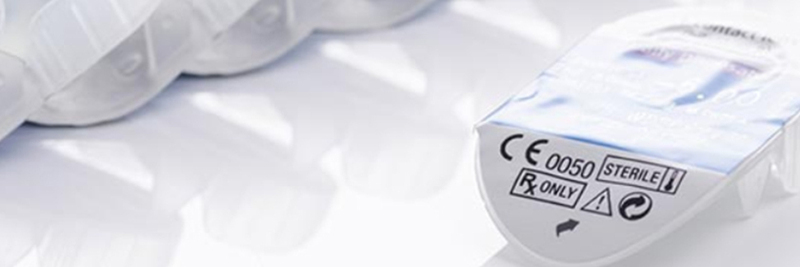
Are contact lenses safe?
Yes, when worn properly and as per your optician’s recommendations, contact lenses are a safe option to correct refractive errors. Following your eye care provider’s advice is especially important,as neglecting advice for the best lens care for your eyes may cause discomfort and risk damaging your eye health.
Can contact lenses damage your eyes?
Soft contact lenses are manufactured using materials and technologies that are designed to keep your eyes healthy and comfortable. A smooth surface design can protect from the build-up of deposits,while the breathable material allows oxygen through the lenses.
Every contact lens varies in material, parameter and design as everyone’s eyes are different. A contact lens fitting with your optometrist will ensure that you wear prescribed contact lenses that support your eye health.
Contact lens fitting
The contact lens fitting appointment is an essential step to ensure that the contact lenses you wear are safe and suitable for your eyes.
During the contact lens fitting appointment, your optometrist asks several questions about your lifestyle, whether you spend your workday in front of the computer, or have any hobbies, and how often you would like to wear contact lenses.
Following this they examine the health and measure the front surface of your eye, after these checks, the optometrist will provide you with contact lenses that fit your requirements and prescription details. They assist you with inserting and removing them, as well as assess the fit of the lenses and the visual acuity while wearing them before issuing you a trial.
Once your trial period is over, you may be called to attend a follow-up appointment, where the optician provides you with your contact lens prescription.
Wearing daily or reusable contact lenses safely
Contact lenses are a simple and comfortable alternative to glasses. There are a few points to consider before wearing your lenses, to ensure they are safe for your eyes.
Daily disposable lenses
Daily disposable contact lenses don’t need cleaning, as they are only worn once before being disposed of at the end of the day. They are a great option for those who wear contacts only occasionally, for example for special events.
Wearing daily lenses for longer
To keep your eyes safe and healthy, don’t overwear your daily lenses.
Wearing daily lenses overnight or for several days can attract bacteria that may lead to infections, as the protective technologies are not designed to last for several days of wear.
Switching between daily and monthly lenses
There are no direct equivalents for daily and reusable lenses, the materials always differ between both as reusable lenses are made to last over an extended period.
If you would like to switch to an alternative lens type, you need to schedule a new contact lens fitting appointment with your optician. This ensures that the new lenses are suitable for your eyes and gives the optometrist a chance to advise you how to clean and store your new lenses properly.
Reusable contact lenses
Soft reusable contact lenses are suitable for bi-weekly or monthly wear, if they are removed at the end of the day, cleaned and stored properly overnight.
There are also some reusable lenses that are licensed for extended wear over several nights, if your optician approved this.
Keeping weekly and monthly lenses comfortable
Reusable lenses are a great option for those who wear lenses on most days. To ensure they feel comfortable from the first to the last day of wear, it is important to follow the correct cleaning regime.
Always use the contact lens solution recommended by your optician and use fresh solution in your contact lens case every time. It is also recommended to replace the lens case every month.

Do’s and Don’ts
Contact lenses are a convenient light-weight option to correct the full field of vision, while keeping the eyes healthy and comfortable.
However, they are considered medical devices and sit directly on the eyes, so there are a few points to consider when wearing lenses, to eliminate possible risks of infections.
Contact lenses and water
Water, whether from a tap or a lake, contains amoeba that can be harmful for eyes. Amoeba can settle on contact lenses and cause painful infections, such as acanthamoeba keratitis. Therefore, it is important to avoid getting your lenses in contact with water, whether that is in your shower at home or swimming in the ocean.
Water should also never be used to clean contact lenses.
Sleeping with contact lenses
Unless your contact lenses are licensed for extended or continuous wear, and you have discussed this option with your optician, you should avoid falling asleep in your contacts. This includes naps.
When you sleep, your eyes are losing moisture, which in turn dries out contact lenses that are not made for extended wear. Dry contact lenses can be harder to remove and may feel stiff and irritating.
When to seek medical help
Regular contact lens check-ups will ensure that your contact lens prescription is up to date and allows the optometrist to examine your eye health.
However, if you ever feel like something isn’t right with your lenses, you can contact your optometrist at any time to voice your concerns.
Feeling discomfort or irritation
When your regular contact lenses suddenly cause discomfort, irritation or make your eyes feel sore, remove them immediately. Try cleaning the lenses thoroughly and check the lens for any imperfections, such as tears along the rim of the lens or particles stuck to the surface. Should this not resolve the issue, replace the lenses with a new set or wear your glasses for the day and discard of the damaged lenses.
If the discomfort or redness doesn’t resolve within 24 hours of not wearing your lenses, contact your optometrist or GP as soon as possible, to ensure your eye health hasn’t been affected.